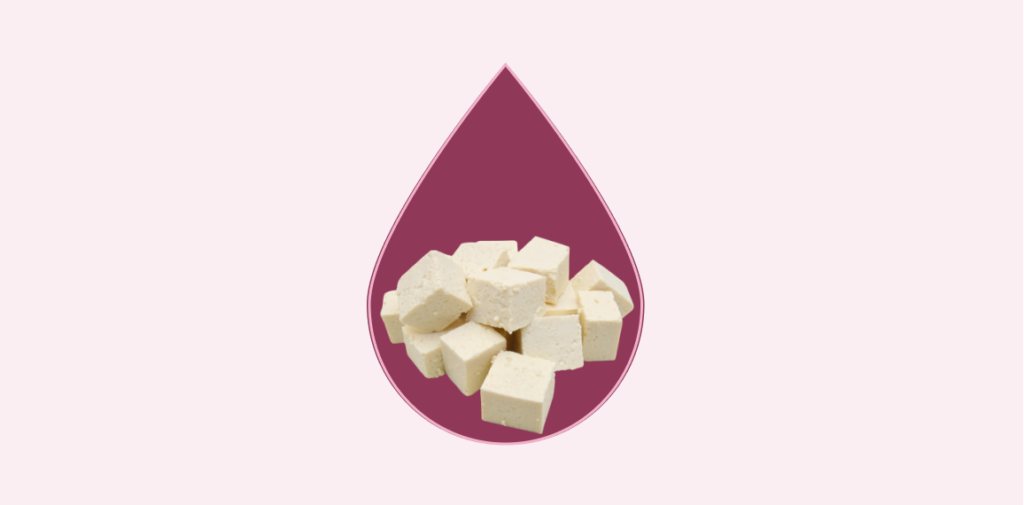Table Of Contents
Is Cottage Cheese Good for Diabetics?
Cottage cheese stands out as an excellent dietary choice for diabetics. This versatile dairy product offers substantial protein content with minimal carbohydrates, making it ideal for blood sugar management. For those navigating diabetes, finding foods that provide essential nutrients without causing glucose spikes is crucial, and cottage cheese perfectly fits this requirement.
Key Takeaways:
- Cottage cheese has a low glycemic index, minimizing blood sugar spikes
- High protein content (11g per 100g) helps stabilize glucose levels
- Low in carbohydrates (3-4g per serving) making it diabetic-friendly
- Rich source of calcium, phosphorus, and vitamin B12
- Studies show it may help lower cholesterol, beneficial for type 2 diabetes complications
The Benefits of Cottage Cheese for Diabetics
Cottage cheese delivers multiple health advantages for people managing diabetes. Its high protein content helps slow digestion and prevent rapid blood sugar fluctuations. With approximately 11 grams of protein per 100-gram serving, cottage cheese provides sustained energy without the glucose spikes associated with carbohydrate-heavy foods.
Research has linked cottage cheese consumption to improved cholesterol profiles, which is particularly important for diabetics who face increased cardiovascular risks. Additionally, the calcium content supports bone health—a significant concern as diabetes can compromise bone density over time.
The minimal carbohydrate content (about 3.4 grams per 100g) makes cottage cheese an ideal snack or meal component for maintaining stable blood glucose levels. Its natural fat content, particularly in full-fat varieties, helps slow carbohydrate absorption, further supporting glycemic control.
For diabetics focused on weight management, cottage cheese offers satisfying nutrition with relatively few calories, helping support overall metabolic health while providing essential nutrients.
Glycemic Index and Glycemic Load of Cottage Cheese
The glycemic index of cottage cheese ranges from 0 to 40, placing it firmly in the low GI category. Foods with a low glycemic index (under 55) are digested and absorbed more slowly, causing a gradual, modest rise in blood sugar levels. This makes cottage cheese an excellent option for blood glucose management.
The glycemic load of cottage cheese is even more favorable, typically below 4 per serving. Glycemic load considers both the quality (GI) and quantity of carbohydrates, providing a more accurate picture of how a food affects blood sugar. The combination of low carbohydrate content and low glycemic index gives cottage cheese an exceptionally low glycemic load.
Research from Oregon State University indicates that foods with low glycemic index values help maintain more consistent blood sugar levels throughout the day. The glycemic index cottage cheese offers makes it particularly valuable for meal planning strategies aimed at preventing glucose spikes and crashes.
For diabetics, this translates to better energy levels, reduced cravings, and improved long-term glucose control—all vital factors in managing diabetes effectively.
Nutritional Breakdown: What Makes Cottage Cheese Diabetic-Friendly
Understanding cottage cheese’s nutritional composition reveals why it’s so valuable for diabetic diets. Here’s what makes this dairy product stand out:
- Protein content: 11 grams per 100g serving, supporting muscle maintenance and satiety
- Low carbohydrates: Only 3.4 grams per 100g, minimizing blood sugar impact
- Calcium: 83% of daily value, supporting bone health often compromised in diabetes
- Vitamin B12: 31% of daily value, important for nerve function and blood cell formation
- Phosphorus: 25% of daily value, essential for kidney function and bone health
The high protein-to-carbohydrate ratio is particularly beneficial for glycemic control. Protein digests slowly and helps maintain steady blood sugar levels while providing essential amino acids. The complete absence of fiber in cottage cheese is offset by its protein content and can be addressed by pairing it with fiber-rich foods like berries or whole grain crackers.
Though cottage cheese contains natural milk sugars (lactose), the amount is modest and balanced by protein and fat, resulting in minimal impact on blood glucose. This nutritional profile makes cottage cheese an excellent choice for diabetics seeking nutrient-dense foods that support blood sugar management.
Also, read – Are Carrots Good for Diabetes & How to Include It in Your Diet
Which Cottage Cheese is Best for Diabetics
When selecting cottage cheese, diabetics should prioritize certain characteristics to maximize health benefits. The best cottage cheese for diabetics generally has these features:
- No added sugars: Choose plain varieties without sweetened fruit mix-ins
- Lower sodium options: Look for “reduced sodium” on labels, as excessive sodium can affect blood pressure
- Organic options: These often contain fewer additives and preservatives
- Grass-fed dairy sources: May offer improved fatty acid profiles with more omega-3s
- Live cultures: Some brands include probiotics, which can support gut health
The debate between low-fat and full-fat options warrants consideration. While low-fat varieties contain fewer calories, full-fat cottage cheese may offer better satiety and contains fat-soluble vitamins. Recent research suggests that the fat in dairy may not negatively impact cardiovascular health as once thought, and can actually help slow carbohydrate absorption.
I recommend reading nutrition labels carefully to identify hidden added sugars or stabilizers. Some brands add thickeners or preservatives that may affect blood sugar in sensitive individuals. Opt for products with the shortest ingredient lists for the most natural option.

Best Cottage Cheese Options for Type 2 Diabetes
Type 2 diabetes presents specific dietary challenges, making careful food selection crucial. The best cottage cheese for diabetics type 2 should address insulin resistance concerns while providing adequate nutrition. Here are optimal choices:
- Higher protein varieties: Look for options offering at least 13g protein per serving
- Moderate fat content: 2% fat varieties balance nutrition and calories effectively
- Lower sodium options: Particularly important as type 2 diabetes increases cardiovascular risk
- No-salt-added varieties: Ideal for those with hypertension alongside diabetes
- Brands with added vitamin D: Supports immune function often compromised in type 2 diabetes
Type 2 diabetics should pay particular attention to serving sizes, as portion control remains key to glucose management. A typical recommended serving is ½ to 1 cup, providing substantial protein without excessive calories or carbohydrates.
For those managing type 2 diabetes alongside weight concerns, cottage cheese offers a nutrient-dense option that supports satiety while providing essential nutrients. Its low impact on blood glucose makes it an excellent choice for snacks or meal components, helping maintain steady energy levels throughout the day.
Consider pairing cottage cheese with cinnamon, which has been shown to improve insulin sensitivity, or with nuts that provide healthy fats and additional protein to further slow carbohydrate absorption and support metabolic health.
How Cottage Cheese Affects Blood Sugar Levels
Cottage cheese has a minimal impact on blood glucose due to its unique nutritional composition. With a low glycemic index ranging from 0-40, it causes a slow, modest rise in blood sugar compared to higher-carbohydrate foods. This gentle effect makes it an excellent choice for maintaining steady glucose levels.
The protein content in cottage cheese plays a crucial role in its blood sugar benefits. Protein triggers minimal insulin response while slowing the absorption of any carbohydrates consumed alongside it. This means even when paired with fruits or other carbohydrate-containing foods, cottage cheese can help moderate the overall glycemic impact of the meal.
Many diabetics report stable blood glucose readings after consuming cottage cheese. However, individual responses can vary based on:
- Personal insulin sensitivity
- Time of day consumed
- Other foods eaten in combination
- Activity levels before and after eating
- Overall metabolic health
For optimal blood sugar management, I recommend testing your glucose levels before and after consuming cottage cheese to understand your personal response. Some individuals may notice slight elevations due to the natural lactose content, while others experience virtually no change in blood sugar levels.
Can Diabetics Eat Cottage Cheese Daily?
Incorporating cottage cheese into your daily diet as a diabetic can offer consistent nutritional benefits. Its protein content helps regulate blood sugar throughout the day, while essential nutrients support overall health. For most diabetics, daily consumption is both safe and beneficial.
The question of how much cottage cheese is appropriate depends on individual factors including:
- Total daily calorie needs
- Protein requirements
- Sodium restrictions (if applicable)
- Overall dietary pattern
- Personal glucose response
A reasonable daily serving for most diabetics ranges from ½ to 1 cup. This provides substantial protein (approximately 12-24g) while keeping carbohydrates minimal (3-7g). The calcium benefit is also significant, with one cup providing roughly 138mg—helping meet daily requirements for this essential mineral.
One consideration for daily consumption is sodium intake. Traditional cottage cheese contains approximately 400-500mg sodium per ½ cup. For diabetics with hypertension or heart concerns, low-sodium varieties are preferable for daily consumption.
Eating cottage cheese daily can help establish consistent eating patterns that support blood sugar stability. Many diabetics find that including it as part of breakfast or as an afternoon snack helps prevent glucose fluctuations and reduces cravings for less healthy options.
Low-Fat vs. Full-Fat: Making the Right Choice for Diabetes
The debate between low-fat and full-fat cottage cheese reflects evolving understanding about dietary fat’s role in diabetes management. Both options offer distinct advantages and considerations for blood sugar control.
Low-fat cottage cheese typically contains 1-2% milkfat and offers:
- Fewer calories (approximately 80-90 per ½ cup)
- Slightly higher protein content per serving
- Less saturated fat
- Often more sodium to compensate for reduced fat
Full-fat cottage cheese (4% milkfat) provides:
- More calories (approximately 110-120 per ½ cup)
- Greater satiety due to fat content
- Better absorption of fat-soluble vitamins
- Potentially slower carbohydrate absorption
Contrary to traditional recommendations, recent research indicates that full-fat dairy may actually benefit glycemic control. The fat content helps slow digestion and reduces the insulin response to the small amount of carbohydrates present. Additionally, full-fat options often contain conjugated linoleic acid (CLA), which may improve insulin sensitivity.
For diabetics focused primarily on weight management, low-fat varieties may be preferable due to their reduced calorie content. However, those struggling with satiety or experiencing frequent hunger might benefit from the greater staying power of full-fat cottage cheese.
The decision between low-fat and full-fat should consider individual glucose responses, weight management goals, and overall dietary pattern. Many diabetics find that testing both options and monitoring blood sugar can help determine which type works best for their metabolism.
Cottage Cheese vs. Other Dairy Products for Blood Sugar Management
When comparing dairy options for diabetes management, cottage cheese stands out for its favorable nutritional profile. Here’s how it compares to other common dairy products:
- Cottage Cheese vs. Yogurt: Cottage cheese typically contains more protein and fewer carbohydrates than yogurt. While Greek yogurt comes close in protein content, regular yogurt often contains 15-20g of carbohydrates per cup compared to just 6-8g in cottage cheese.
- Cottage Cheese vs. Regular Cheese: While hard cheeses like cheddar contain minimal carbohydrates, they’re significantly higher in fat and calories. Cottage cheese offers more protein per calorie and less saturated fat.
- Cottage Cheese vs. Milk: Milk contains about 12g of carbohydrates per cup, making it much higher in sugar than cottage cheese. The protein-to-carbohydrate ratio of cottage cheese is more favorable for blood sugar management.
- Cottage Cheese vs. Cream Cheese: While cream cheese is low in carbohydrates, it offers significantly less protein and more fat than cottage cheese, making it less effective for balancing blood sugar.
Research suggests that the specific combination of whey and casein proteins in cottage cheese provides a sustained amino acid release, supporting steady blood sugar levels over several hours. Additionally, the calcium in dairy products may improve insulin sensitivity, with cottage cheese offering excellent calcium content per serving.
For diabetics seeking the most blood-sugar-friendly dairy option, cottage cheese offers the best balance of high protein, low carbohydrates, moderate fat, and significant calcium—all factors that support glycemic control and overall nutritional needs.
5 Delicious Ways to Include Cottage Cheese in a Diabetic Diet
Incorporating cottage cheese into your meal plan doesn’t have to be boring. Here are five creative and blood-sugar-friendly ways to enjoy this versatile food:
- Savory Breakfast Bowl: Top ½ cup cottage cheese with diced cucumber, cherry tomatoes, everything bagel seasoning, and a drizzle of olive oil. The combination of protein and healthy fats keeps blood sugar stable all morning.
- Protein-Packed Pancakes: Blend ½ cup cottage cheese with 2 eggs, 2 tablespoons almond flour, and ¼ teaspoon baking powder. Cook like regular pancakes for a low-carb, high-protein breakfast that won’t spike blood sugar.
- Stuffed Avocado: Fill half an avocado with ¼ cup cottage cheese, a squeeze of lime, and a sprinkle of chili powder. This combination provides protein, healthy fats, and fiber—a perfect trifecta for glycemic control.
- Veggie Dip: Blend 1 cup cottage cheese with fresh herbs like dill and chives, a clove of garlic, and a splash of lemon juice. Use as a protein-rich dip for raw vegetables for a satisfying snack with minimal impact on blood sugar.
- Berry Parfait: Layer ½ cup cottage cheese with ¼ cup fresh berries and 1 tablespoon chopped walnuts. The fiber from berries and healthy fats from nuts slow the absorption of natural sugars for stable glucose levels.
These recipes focus on pairing cottage cheese with other diabetes-friendly ingredients that help slow carbohydrate absorption and provide additional nutrients. The combinations of protein, healthy fats, and fiber help minimize blood sugar fluctuations while maximizing nutritional value.
For best results, I recommend measuring portions to maintain awareness of carbohydrate intake, especially when adding fruits or other carbohydrate-containing ingredients to cottage cheese recipes. This helps ensure predictable blood sugar responses while still enjoying delicious and satisfying meals.

Reading Labels: What to Look for When Buying Cottage Cheese
Selecting the optimal cottage cheese for diabetes management requires careful label reading. Here’s what to check before purchasing:
- Carbohydrate content: Look for options with 4-6g of carbohydrates per serving. Some brands contain added starches or thickeners that increase carb content.
- Added sugars: Check for 0g added sugar. Flavored varieties often contain added sweeteners that can affect blood glucose.
- Protein content: Higher protein options (13g+ per serving) provide better blood sugar stability.
- Ingredient list: Shorter is better. Ideally, you’ll see milk, cream, salt, and cultures—nothing more.
- Sodium content: Compare brands for sodium content, which can range from 300-500mg per serving in regular varieties.
Be cautious of marketing claims like “fruit on the bottom” or “protein fortified,” as these products often contain hidden sugars or additives. While “low-fat” or “no-fat” varieties may seem appealing, they sometimes compensate with additional sodium or stabilizers that can affect blood sugar in sensitive individuals.
Another consideration is organic certification. Organic cottage cheese typically contains fewer additives and comes from cows not treated with antibiotics or growth hormones, which some research suggests may impact insulin sensitivity.
For those sensitive to lactose, some brands offer lactose-free cottage cheese that maintains the protein and calcium benefits while eliminating the milk sugar that can affect some diabetics. These products are enzymatically treated to break down lactose without significantly altering the nutritional profile.
Also, read – Can Diabetics Take Beet Juice? The Benefits and Drawbacks
Cottage Cheese Carbohydrate Content and Keto Compatibility
Cottage cheese contains approximately 3-6 grams of carbohydrates per ½ cup serving, positioning it as a moderate-carb dairy option. This carbohydrate content comes primarily from naturally occurring lactose (milk sugar) rather than added sweeteners, giving it a more favorable impact on blood glucose levels.
For those following ketogenic diets while managing diabetes, cottage cheese can fit within daily macronutrient targets when consumed thoughtfully. The standard ketogenic diet typically restricts carbohydrates to 20-50g daily, making a serving of cottage cheese compatible when counted within this allowance.
Here’s how cottage cheese compares to other dairy products in carbohydrate content per ½ cup:
- Cottage Cheese (2%): 4-5g carbohydrates
- Greek Yogurt (plain): 3-4g carbohydrates
- Regular Yogurt (plain): 5-8g carbohydrates
- Heavy Cream: 1-2g carbohydrates
- Sour Cream: 2-3g carbohydrates
The protein-to-carbohydrate ratio of cottage cheese makes it particularly valuable for ketogenic diabetics. With roughly 12-14g of protein per 4-5g of carbohydrates, it provides substantial nutrition while minimizing carb intake. This ratio helps maintain muscle mass during ketosis while supporting blood sugar stability.
For strict keto adherence, full-fat cottage cheese offers a better macronutrient profile with slightly fewer carbohydrates and more fat than low-fat varieties. Some brands now offer specialized “keto” cottage cheese with added cream to increase fat content while maintaining the protein benefits.
Comparing Sodium Levels in Different Cottage Cheese Brands
Sodium content varies significantly across cottage cheese brands, an important consideration for diabetics who often have concurrent hypertension concerns. Regular cottage cheese typically contains between 300-500mg of sodium per ½ cup serving—approximately 15-20% of the recommended daily limit.
Here’s how various cottage cheese types compare in sodium content:
- Regular cottage cheese: 400-500mg sodium per ½ cup
- Reduced sodium cottage cheese: 200-300mg sodium per ½ cup
- No-salt-added cottage cheese: 30-80mg sodium per ½ cup (natural sodium from milk)
- Flavored cottage cheese: Often higher at 450-550mg per ½ cup
For diabetics monitoring both blood sugar and blood pressure, the reduced sodium or no-salt-added varieties offer clear advantages. However, many people find these options less palatable. A practical approach is to enhance no-salt varieties with herbs, spices, or a small amount of salt-free seasoning blend to improve flavor without increasing sodium.
It’s worth noting that some cottage cheese brands use potassium chloride as a sodium substitute. While this helps reduce sodium content, individuals with kidney disease or those taking certain medications should consult healthcare providers before choosing these products, as elevated potassium levels can be problematic for some conditions that commonly co-occur with diabetes.
When comparing labels, look beyond just the sodium number—consider the serving size as well. Some brands list nutrition information for ½ cup while others use ¾ cup or even 1 cup as their standard serving, making direct comparisons challenging without normalizing to a consistent portion size.
How to Pair Cottage Cheese with Other Foods for Optimal Blood Sugar Control
Strategic food pairing can enhance cottage cheese’s blood sugar benefits. Combining cottage cheese with complementary foods creates balanced nutritional profiles that support stable glucose levels and provide sustained energy. Here are effective pairing strategies:
- Add healthy fats: Incorporating nuts, seeds, avocado, or olive oil with cottage cheese slows digestion and reduces glycemic impact. A tablespoon of chia seeds or ground flaxseed adds both fat and fiber.
- Include fiber-rich foods: Pairing cottage cheese with non-starchy vegetables like cucumber, bell peppers, or celery adds minimal carbohydrates while providing fiber that slows glucose absorption.
- Choose low-glycemic fruits: Berries (especially strawberries and blackberries) offer antioxidants and fiber with modest carbohydrate content, making them ideal companions to cottage cheese.
- Add cinnamon or nutmeg: These spices not only enhance flavor but may also improve insulin sensitivity and glucose metabolism.
- Incorporate protein partners: Adding a hard-boiled egg or a few slices of turkey alongside cottage cheese creates a multi-protein snack that provides lasting satiety.
The timing of consumption also matters. Cottage cheese makes an excellent bedtime snack, as its casein protein digests slowly, providing a steady amino acid release throughout the night and helping prevent morning blood sugar spikes. For this purpose, pairing it with a small amount of complex carbohydrates (like a few whole grain crackers) can support sustained glucose levels overnight.
For post-exercise recovery, combining cottage cheese with a small piece of fruit provides both quick-acting and slow-digesting carbohydrates to replenish glycogen while the protein supports muscle repair. This combination helps prevent post-workout hypoglycemia while supporting recovery.
Cottage Cheese as Part of a Balanced Diabetic Meal Plan
Integrating cottage cheese into a comprehensive diabetic meal plan can enhance overall nutrition while supporting glucose management. As a versatile protein source, cottage cheese works well across multiple meals and snacks throughout the day, providing nutritional variety and blood sugar stability.
Here’s how cottage cheese can fit into a balanced diabetic meal pattern:
- Breakfast: ½ cup cottage cheese topped with 2 tablespoons chopped walnuts and ¼ cup berries provides protein, healthy fats, and fiber to start the day with stable blood sugar.
- Lunch: A mixed green salad with ½ cup cottage cheese, chopped vegetables, olive oil, and vinegar offers a low-carb, nutrient-dense midday option.
- Dinner accompaniment: ¼ cup cottage cheese alongside grilled protein and non-starchy vegetables adds calcium and additional protein without significant carbohydrates.
- Snacks: ½ cup cottage cheese with cucumber slices or celery provides steady energy between meals without glucose spikes.
- Dessert alternative: ½ cup cottage cheese mixed with unsweetened cocoa powder and a few drops of liquid stevia satisfies sweet cravings with minimal impact on blood sugar.
When incorporating cottage cheese into a diabetic meal plan, consider the total macronutrient balance of each meal. Aim for a combination of protein (cottage cheese and other sources), healthy fats, and limited complex carbohydrates, with plenty of non-starchy vegetables for fiber, vitamins, and minerals.
For meal planning purposes, count cottage cheese primarily as a protein source (with approximately 14g protein per ½ cup), while accounting for its modest carbohydrate content (4-5g per ½ cup) within your daily carbohydrate allowance. This approach ensures you’re tracking all macronutrients accurately for optimal blood sugar management.
Remember that individual responses to foods vary—monitoring blood glucose before and after meals containing cottage cheese helps determine your personal response and allows for adjustments to serving sizes or companion foods as needed.
Conclusion: Enjoy the Health Benefits!
Cottage cheese stands as an excellent dietary choice for diabetics seeking balanced nutrition without blood sugar spikes. Its impressive protein content, minimal carbohydrates, and essential nutrients make it a valuable addition to glucose-conscious meal plans.
The low glycemic index of cottage cheese means it can be enjoyed confidently as part of regular meals or snacks without concern for dramatic blood sugar fluctuations. Whether you choose low-fat or full-fat varieties depends on your overall health goals and personal preferences—both can be incorporated effectively into a diabetic eating pattern.
For optimal benefits, I recommend selecting varieties with minimal additives, monitoring portion sizes to align with your individual calorie and carbohydrate needs, and pairing cottage cheese strategically with other diabetes-friendly foods like non-starchy vegetables, nuts, seeds, and berries.
As with any dietary choice, personal monitoring remains key. Testing your blood glucose response to cottage cheese helps confirm it works well with your unique metabolism. While cottage cheese offers numerous advantages for most people with diabetes, individual responses can vary based on overall health status and diabetes management approach.
By incorporating cottage cheese thoughtfully into your meal plan, you gain a versatile, nutritious food that supports stable blood sugar while contributing to overall health and wellbeing—a true win for diabetic nutrition.
Rebecca is a nurse, yoga teacher, and freelance copywriter with a passion for holistic health and self-development. When she’s not working in the health sector, she enjoys hiking the outdoors, cooking, and traveling.









